- Home
- Brian Hodge
Whom the Gods Would Destroy Page 8
Whom the Gods Would Destroy Read online
Page 8
It was, yes, but it wasn’t the kind of thing I was looking for. Not that I actually knew what I was looking for, I just trusted it would sound promising when I heard it. Actually, this was notable in its own way, but by omission, as none of my mother’s experiments appeared to have taken place during the Geminids. Even she seemed to know there was something different about them. Something…
Unworkable?
“Stranger,” I said. “Go nuts. I’m thinking more along the lines of stuff we never would’ve heard in class. Or if we did, it was only so everybody could have a good laugh. ‘Oh, those superstitious natives…’”
It still took her a minute or three to get beyond orthodox thinking and the approved canonical ideas she would’ve heard in lecture halls, but then I remembered the magic word that might steer her in the proper direction.
“If it connects in any way to the panspermia theory, so much the better.”
“Seriously?” She put her spoon back in her bowl. “Where is this coming from? This can’t have anything to do with the department.”
“Just playing with some crazy ideas.” I pretended to be sheepish about it, as if I were unworthy of even bringing up the notion. Which wasn’t entirely an act. “Arthur C. Clarke. He’s always been a hero of mine. He did real research, he wrote novels. Why can’t I have it both ways, too?”
“I never knew,” she said, and grinned. “That approaches cool.” She gave it some more thought. “There’s this weird, heretical theory I ran across when I was in high school. I did a College Prep Writing paper on it, where you had to take both sides of an issue and argue with yourself. You might call it a subset of panspermia. It isn’t just that there’s organic material floating around in the dust of a comet’s tail. The director of the Cardiff Center for Astrobiology, I don’t remember his name, said that alien life sifting down through the atmosphere is an almost everyday occurrence. Like, flu viruses.”
“No kidding?”
“He claimed to find a statistically significant correlation between meteor showers and bad flu outbreaks. The worst one was the Spanish flu. He thinks that was literally not of this world.”
It was a sobering thought. Between 1918 and 1920, as much as a third of the global population had been infected with Spanish flu, and for as many as 100 million of them, it had been fatal.
“What made him reach that conclusion?”
“How fast it spread. Especially the second-wave outbreak. It covered the Earth in an incredibly short time. It was so fast that, even today, with jet travel, you’d have a hard time matching the speed of person-to-person transmission. And that did happen, there’s no question about that. People did catch it from each other. But even when it was obvious that was what was going on, it was slow. It would take days, weeks, to spread not very far at all. But at the same time, it was showing up simultaneously in places all over the world that didn’t have any contact with each other.”
She’d been idly stirring her bowl while speaking, and set aside a spoonful of beans. She picked them out one at a time, to plink them back in at different locations.
“Up there, that big chunk of turkey, that’s Alaska. See how isolated it is?”
The world in a bowl of white chili—only geeks thought this way. This was the kind of girl that Ashleigh wondered if maybe I shouldn’t be with. Maybe she was right. Or, if not now, maybe she would be.
“Even today, when winter sets in, it can be hard to get around in Alaska. And if you were there in the winter of 1918, you were snowbound for the season. Or limited to the range of your dogsled.” She flicked a few more beans at the turkey nugget. “But all of a sudden the Spanish flu broke out there, too. In villages that hadn’t seen anybody from the outside for months. That was one of the biggest arguments in favor of something else going on besides person-to-person infections.”
“In that debate with yourself, for your paper,” I said. “Which side did you end up coming down on?”
She jabbed her spoon back into her bowl and stirred everything up again. “It doesn’t matter. That was high school. This is now.”
“The guy that proposed the theory…he wasn’t implying there was any kind of intention behind it, was he?”
“You mean like a bioweapon? No. Nothing like that. It was just something that happened. Like the asteroid that wiped out the dinosaurs. We just spent a couple years sailing through a giant cloud of super-nasty organisms we weren’t equipped to deal with. The universe didn’t care. The universe didn’t even notice. It was just part of the process.” She sounded glum, then sat up straighter and made a point of shaking it off. “That was the theory, anyway.”
“What if there was intention behind it?” I said.
“Then maybe by now the Earth would look very very very very different. They say that DNA is the perfect von Neumann probe.”
And if I’d found my appetite dwindling, that killed it off altogether.
“So is all that strange enough? Does that work for you?” Devangana asked. She seemed to want it so, very much, and that if it wasn’t, she would’ve regarded it as her fault.
“Yeah. It works.” I’m afraid that it does.
“You don’t look very happy about it.”
“Oh…you know how it is, when you get too much of a good thing.” I forced a smile that I hoped would be convincing. “Where to begin, huh? Where to begin?”
* * *
It was the kind of thing that could keep you up nights, staring at the ceiling, if you had half a reason to obsess on it. And I did. I’d seen a glimpse of it in the window of a building that had vanished. I’d seen what it could do, and what it could leave behind. I’d seen what it had used as its raw material, and what it had made of her.
DNA is the perfect von Neumann probe.
While space exploration makes for great movies and TV about going boldly where nobody has gone before, the reality has a couple of crippling limitations. A crewed flight isn’t very efficient, and, once you’re able to make the leap past your own solar system, it takes a long time to get anywhere. Even if we were to achieve interstellar travel at light speed, it would still take years, decades, even centuries, to reach anyplace likely to be worth the trip—a world capable of hosting something we might recognize as life. Eso1241, orbiting Alpha Centauri B? At 4.3 light years away, that would be our tiniest baby step, but still put us at a planet so brutalized by its sun that it glows. Gliese 581C? Better. That one’s cool enough for liquid water, but now we’re talking about a twenty-year voyage.
Which is why a lot of people are holding out hope that folding spacetime and taking those fabled shortcuts through wormholes proves to be more than just a theory.
Until then, an intermediary idea is the generational starship. A large crew—and call it what it is, a breeding population—takes off on a one-way trip to live, mate, age, and die on this singular vessel, so their grandchildren might someday have the privilege of setting foot on some distant habitable world they never asked to go to.
Lots of ways that could go wrong.
With 200 billion stars in our galaxy alone, across a span of 90,000 light years, it’s a numbers game. There has to be a more mathematically efficient way of conducting exploration.
And there is: a hypothetical probe named for mathematician and physicist John von Neumann.
First, though, subtract human beings from the picture. We’re soft and vulnerable and unpredictable and, unfortunately, life support consumes a lot of resources. Instead, intelligent machinery is the way to go.
So build your probe, then launch it toward a system you want to investigate. After it arrives, it not only explores and reports back its findings. It also touches down on a planet or moon, and uses the available matter there to build copies of itself—ten, a hundred, a thousand, more. These, in turn, set off for their own destinations, to do the same, in an escalating geometric progression that spreads out to explore what lies beyond.
Technologically, it’s a dream that lies far in a future we may n
ever even achieve.
But even in our own world, biology has already been there for billions of years, ever since that first cellular organism began to divide and replicate its DNA.
Sometimes it seems as if the best technology is still only catching up to what nature has already figured out.
* * *
And so the question followed me no matter where I went: What am I supposed to do with these things I’ve learned?
This was less a debate than it may seem like it should’ve been.
The cautionary tales had been as much a part of my upbringing as neglect and lies. It was a staple among the stories I grew up on, the other ones, the ones that exploited the darker flipside of the hopeful, formative sagas that had me looking to the skies as an irresistible horizon. Invasion of the Body Snatchers, Terminator 2, Twelve Monkeys…what would they be without that one crazed character who knows a truth nobody else does, that nobody else is even prepared to believe.
It was a question I’d never considered until now: Was it the knowing alone that drove them mad? Or was it the futility of trying to convince someone else of something that sounded so stark raving bonkers that bonkers could only turn into a self-fulfilling condition?
I’d had all the anti-role-models anyone needed, and I knew how I didn’t want to end up. They may have come from the world of movies, but that didn’t make the truth of their plight any less valid. If a cataclysm was coming, I didn’t want to meet it with a deranged mind. I wanted to meet it with my faculties intact, and without the gloating cry of “I told you so” on my lips.
There was just so much more dignity in that than in all the running around and flailing for attention and yelling at people how fucked they are, which never seems to get through to them anyway.
So I did nothing. Told no one. And lived with it, like a disease that might lie forever in the dormancy of remission, or could turn and run aggressively rampant.
Your move, whatever you are.
I resumed classes, thanking my professors for their understanding while I’d gotten my family issues sorted out. I caught up on what I’d missed. I went back to my realm of red dwarves and looked forward to my sessions using the telescope feed from Apache Point. I tried to believe that my place in the world remained unchanged—or at least unchanged until further notice—and that I still had contributions to make that would help the world know itself and its place in the cosmos a little better, even though all the evidence showed that most people were content to muddle through each day in willful ignorance, choosing to believe in a god that took sides in the Super Bowl and a devil who’d hidden dinosaur bones in 6000-year-old rocks to test the faithful.
Sometimes…
Sometimes the idea of extinction events didn’t seem all that bad.
They weren’t the end of the world. And so much creativity sprang up in their aftermath.
Which made me think of the tract that my brother was alleged to have written, To Love the Earth, To Hate the World, and wonder what the motivation behind it really was. Which made me think of one of the professors I’d had as an undergrad, a stoop-shouldered fellow with the graying, disheveled look of an Einstein acolyte, and the uncharacteristic sorrow he showed one evening as he contemplated the stars and confessed, “I really thought we’d be out there by now. I really did. But we’ve become a complacent species without will.”
We can rationalize any act, any inaction.
Still, I hadn’t lost the capacity to wonder. There was something loose in the world, wearing the mutated skin of someone I’d once wanted to love me, to see me, and it had learned to hide, and I couldn’t begin to fathom how she’d done any of it.
After all, if the oddball theory that Devangana had related was right, that DNA from outside our world was routinely sifting through the atmosphere to our terrestrial orb, then it seemed as if the planet should’ve been overrun with such beings long ago. There would be no us, or the civilizations we’d created. Early man should’ve become something very different.
Yet there seemed to be just one.
And why her? She was nobody. No training, no specialized education, no great resources. So why had this knowledge become hers in the first place? I recalled what my father had said about her, and how she’d been typical of girls who’d heard a calling: Rather go to Mass than go to school, rather light a candle than spark up a joint… Dreams telling her what to do.
Revelation, they call it, and it stood in opposition to everything I ever believed in.
As I saw all this now, my mother had years of failed experiments behind her. It had only worked when she herself had become the subject. Was there something measurably different about her? Was her DNA somehow…compatible? Yet that didn’t explain everything either. Her exposure to these agents of change must have been constant throughout. Yet they hadn’t taken root until—what? She’d accepted them?
But that’s the folly of trying to explain other minds, greater intelligences. We can’t help but do so by first running them through our own limited filters. We imagine they must think like we do.
And so, as before, every day, nearly every waking hour, I checked the news for signs of her passage in this world that she, too, must have hated. I watched, listened, for evidence that a new end was beginning.
But otherwise did nothing.
The guilt only got bad when I saw large groups and crowds, and thought how none of them had a clue what they now shared the world with, or even suspected what they had been breathing. It was like that on Halloween, when Ashleigh talked me into going with her to take part in the zombie walk that started from the Space Needle. It sounded silly, but…why not? Hundreds of us, maybe thousands, made up like corpses and turning rot into an aesthetic, shuffling for hours through the streets for the amusement of people who pointed and laughed and cheered, confident that things like this could never happen.
At one point as Ashleigh and I kissed, blood on our mouths, I finally accepted what a lifeline she really was, deserving of more commitment than I thought I’d been willing to offer.
“When the end comes,” I told her, “I want to be with you.”
She thought the last part was romantic, and the first part just a timely joke.
That helped too, actually.
Then we went back to her apartment and it all changed again, as if the sickness my mother had inflicted on Cameron and me was intent on having its say, no matter what it had to use or corrupt.
I’d acknowledged all along that Ashleigh’s refrigerator was one of the things that helped keep me inspired, grounded. The clippings and printouts she hung on the door, her Reasons of the Day, were a kind of north star, every day another cause to feel proud of the human race, and buoyed by its capacity for goodness and potential.
So it was a shock, standing on the kitchen tiles, looking like the dead man she’d made me up to be, with pallid skin and dark-rimmed eyes, adorned with blood and wounds, intending to finish the night with uplift and instead looking at what she had put there for me to find.
I have no doubt that she thought I would like it. It was a cheesy yet beautiful composite made mostly of Hubble photos, nothing to scale, with lumpy, luminescent clouds of gas and dust, and starfields of brilliance and depth, and the unmistakable form of Orion, and the point of it all: rising from the rolling plain of the Horsehead Nebula, the towering silhouette of a man.
The caption: You are the universe expressing itself as a human being for a little while.
And for a little while longer, I could think of nothing worse.
* * *
Days passed. A week. Two. And still, the Earth turned on its axis and orbited the sun, and our solar system held steady two-thirds of the way out on the Orion arm of the Milky Way, whose spiral pattern kept us whirling around its core at 514,495 miles per hour, while the universe continued to expand, and it did all this without any threat of interruption I could spot on scales great or small.
I’d never been such a news junkie before, and frankly, it
was getting boring. But boring was good, even when boring meant political gridlock and wars and dictators murdering their own people by the score. This, at least, was our normal.
And if we’d made it to Thanksgiving, maybe I would’ve professed gratitude that that’s the way everything had stayed, and that this threat I had perceived looked worse than it really was, and had vanished of its own accord.
But we didn’t.
Maybe I shouldn’t have relaxed until after the middle of the month, and we’d gotten past the November highlight for sky-watchers: the Leonids.
But I did.
We were heading into the weekend and, as with most of them, Ashleigh came by my place after she’d gotten off work, and the first thing she did, before she would even kiss me, was shower, the water hot and furious and she would stay in a long time. And whenever she came out, she never once looked like the same woman who went in.
She then freely gave me what all those other guys, just watching, could only dream about. Even so, no matter how strenuous, no matter how deep, no matter what she told me in the heat of it or how urgent her voice, it felt as if they were still getting something that I would never quite have from her.
That, too, was normal, until it all went wrong.
It started with a car alarm down at the end of the block. But who pays attention to those?
Or maybe it started with a more distant sound, the faraway sirens I thought I’d heard while the two of us were locked and entangled. There seemed to have been an inordinate number of sirens that night, but again, when you live in a city, tuning out irrelevant noise is just a part of doing business.
You grumble and roll over and go back to sleep. Easy.
Nights are worse for something like this. It filters into your dreams, and when the clamor and uproar finally get bad enough to jolt you awake, there are those awful moments when you have no idea what’s real and what isn’t. Worst of all is admitting you don’t have a clue what real even means anymore.

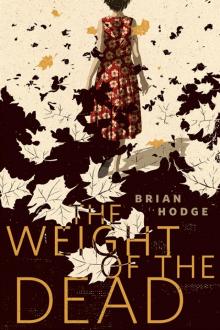 The Weight of the Dead
The Weight of the Dead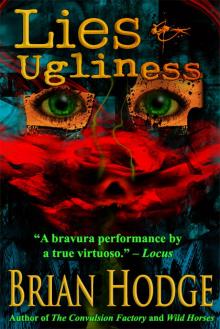 Lies & Ugliness
Lies & Ugliness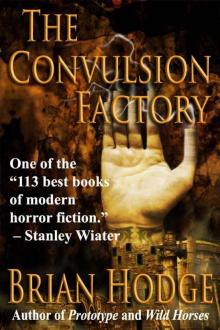 The Convulsion Factory
The Convulsion Factory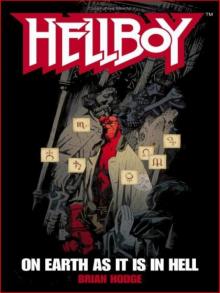 Hellboy: On Earth as It Is in Hell
Hellboy: On Earth as It Is in Hell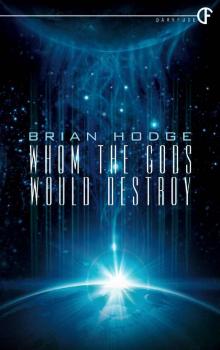 Whom the Gods Would Destroy
Whom the Gods Would Destroy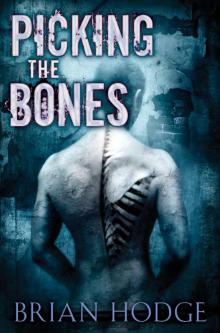 Picking the Bones
Picking the Bones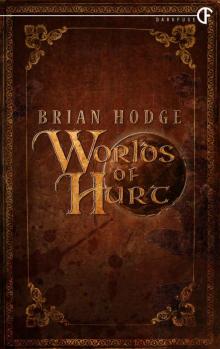 Worlds of Hurt
Worlds of Hurt Oasis
Oasis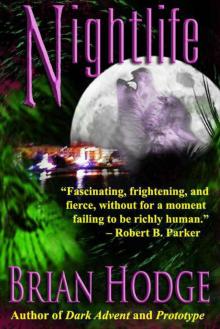 Nightlife
Nightlife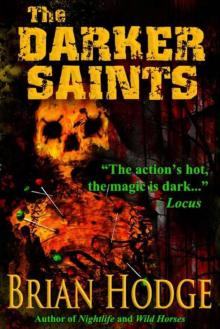 The Darker Saints
The Darker Saints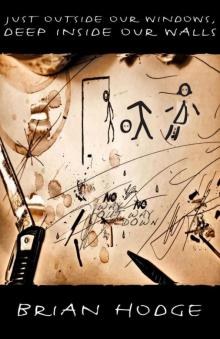 Just Outside Our Windows, Deep Inside Our Walls
Just Outside Our Windows, Deep Inside Our Walls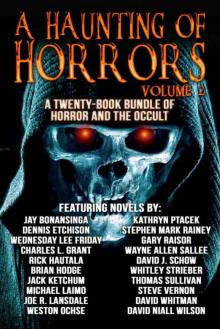 A Haunting of Horrors, Volume 2: A Twenty-Book eBook Bundle of Horror and the Occult
A Haunting of Horrors, Volume 2: A Twenty-Book eBook Bundle of Horror and the Occult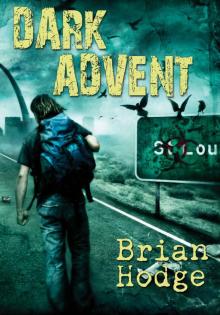 Dark Advent
Dark Advent Mad Dogs
Mad Dogs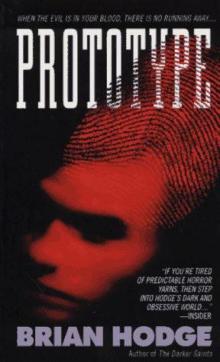 Prototype
Prototype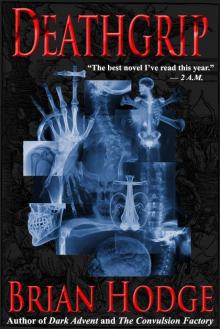 Deathgrip
Deathgrip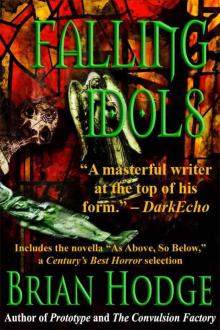 Falling Idols
Falling Idols